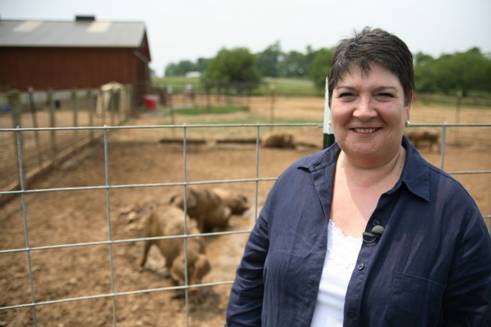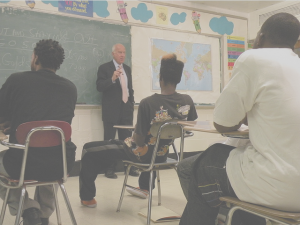 The following is a guest post by Marci Alboher, vice president at Civic Ventures, a think tank making it easier for millions to find encore careers with personal meaning and social impact. This is part of the kickoff to a series on social entrepreneurship. The views expressed are the author’s own.
The following is a guest post by Marci Alboher, vice president at Civic Ventures, a think tank making it easier for millions to find encore careers with personal meaning and social impact. This is part of the kickoff to a series on social entrepreneurship. The views expressed are the author’s own.
Mark Goldsmith created Getting Out and Staying Out, a program that reduces the recidivism rate of young men released from prisons and jails. Elaine Santore founded Umbrella of the Capital District, a service that pairs retired handy people with aging homeowners who need help with small home repairs. And Adele Douglass (see above photo) created Humane Farm Animal Care, the nation’s first program to certify that farming practices are humane from birth to slaughter.
They are all social entrepreneurs — creative, inventive, enterprising individuals who bring their talent and passion to solving the problems of our day — and they are all over the age of 55.
Instead of slowing down, they’re just starting up. With nearly 80 million boomers beginning to enter their 60s, we should expect to see more of these innovators.
According to a 2009 Kauffman Foundation report, the highest rate of entrepreneurial activity over the past decade has come from those between the ages of 55 and 64. In a time when so much attention and hopes are placed on bright, young minds, these older entrepreneurs bring a most valuable asset that is too often overlooked — experience.
Mark Goldsmith, 73, in below photo, says that his 35 years as an executive in the cosmetics industry helped him treat his nonprofit like a business from the start. “In the nonprofit sector, we’re still looking for the bottom line; we’re just characterizing it differently,” he says. “It’s about starting to see the light in someone’s eyes.”

Elaine Santore, 59, who had had a successful career in graphic design, says there’s something about reaching a life stage where “you’ve had a career, you’ve had your family, and it’s time to give back.”
As her own relatives aged, she started seeing older people being forced to give up their homes and move into nursing homes, not because they couldn’t maintain themselves physically, but because they could no longer maintain their homes.
“This population deserved more then they were getting. We saw the problem, and we came up with a solution — not the solution, but a solution,” Santore explains.
Adele Douglass, 63, says that having a little seasoning made it easier (but by no means easy) to do something about an injustice she saw — the mistreatment of animals raised for our food supply.
“You really need some knowledge to go out and fix something that’s broken,” she says. “As someone who’d worked in public policy, I had been around legislation long enough to know that more legislation wasn’t the answer. I’d also been a homemaker and a mother who knew how to multitask and sacrifice.”
Another benefit of age — once her kids were out of the house, Douglass had no one to take care of but herself. Her five grandchildren had an influence too; they were old enough to start asking questions about the food they were eating, and she wanted to see change in her lifetime.
Today’s 60-year-olds see another 10 or 20 years for productive, meaningful encore careers. While some will need to work longer for income, others are seizing these bonus years as a time to do what may be the most significant work of their lives.
Last month, the world lost Dr. Robert Butler, the Pulitzer Prize-winning expert on aging who coined the term, “ageism.” Butler was the founder of the National Institute on Aging and the creator of the first department of geriatrics at a United States medical school. According to the New York Times, he was putting in 60-hour work weeks until days before his death at age 83.
We need everybody at work, bringing the best ideas to life. As Mark Goldsmith says, “If you think there is a population that needs your attention, just do something.” If you need even more inspiration, have a look at Vogue’s August Issue — highlighting reinvention at every age.
Top photo: Adele Douglass, founder of Humane Farm Animal Care, at her farm in Virginia.

Reuters – Adele Douglass
Posted: August 10, 2010 by Certified Humane
Mark Goldsmith created Getting Out and Staying Out, a program that reduces the recidivism rate of young men released from prisons and jails. Elaine Santore founded Umbrella of the Capital District, a service that pairs retired handy people with aging homeowners who need help with small home repairs. And Adele Douglass (see above photo) created Humane Farm Animal Care, the nation’s first program to certify that farming practices are humane from birth to slaughter.
They are all social entrepreneurs — creative, inventive, enterprising individuals who bring their talent and passion to solving the problems of our day — and they are all over the age of 55.
Instead of slowing down, they’re just starting up. With nearly 80 million boomers beginning to enter their 60s, we should expect to see more of these innovators.
According to a 2009 Kauffman Foundation report, the highest rate of entrepreneurial activity over the past decade has come from those between the ages of 55 and 64. In a time when so much attention and hopes are placed on bright, young minds, these older entrepreneurs bring a most valuable asset that is too often overlooked — experience.
Mark Goldsmith, 73, in below photo, says that his 35 years as an executive in the cosmetics industry helped him treat his nonprofit like a business from the start. “In the nonprofit sector, we’re still looking for the bottom line; we’re just characterizing it differently,” he says. “It’s about starting to see the light in someone’s eyes.”
Elaine Santore, 59, who had had a successful career in graphic design, says there’s something about reaching a life stage where “you’ve had a career, you’ve had your family, and it’s time to give back.”
As her own relatives aged, she started seeing older people being forced to give up their homes and move into nursing homes, not because they couldn’t maintain themselves physically, but because they could no longer maintain their homes.
“This population deserved more then they were getting. We saw the problem, and we came up with a solution — not the solution, but a solution,” Santore explains.
Adele Douglass, 63, says that having a little seasoning made it easier (but by no means easy) to do something about an injustice she saw — the mistreatment of animals raised for our food supply.
“You really need some knowledge to go out and fix something that’s broken,” she says. “As someone who’d worked in public policy, I had been around legislation long enough to know that more legislation wasn’t the answer. I’d also been a homemaker and a mother who knew how to multitask and sacrifice.”
Another benefit of age — once her kids were out of the house, Douglass had no one to take care of but herself. Her five grandchildren had an influence too; they were old enough to start asking questions about the food they were eating, and she wanted to see change in her lifetime.
Today’s 60-year-olds see another 10 or 20 years for productive, meaningful encore careers. While some will need to work longer for income, others are seizing these bonus years as a time to do what may be the most significant work of their lives.
Last month, the world lost Dr. Robert Butler, the Pulitzer Prize-winning expert on aging who coined the term, “ageism.” Butler was the founder of the National Institute on Aging and the creator of the first department of geriatrics at a United States medical school. According to the New York Times, he was putting in 60-hour work weeks until days before his death at age 83.
We need everybody at work, bringing the best ideas to life. As Mark Goldsmith says, “If you think there is a population that needs your attention, just do something.” If you need even more inspiration, have a look at Vogue’s August Issue — highlighting reinvention at every age.
Top photo: Adele Douglass, founder of Humane Farm Animal Care, at her farm in Virginia.
Category: news